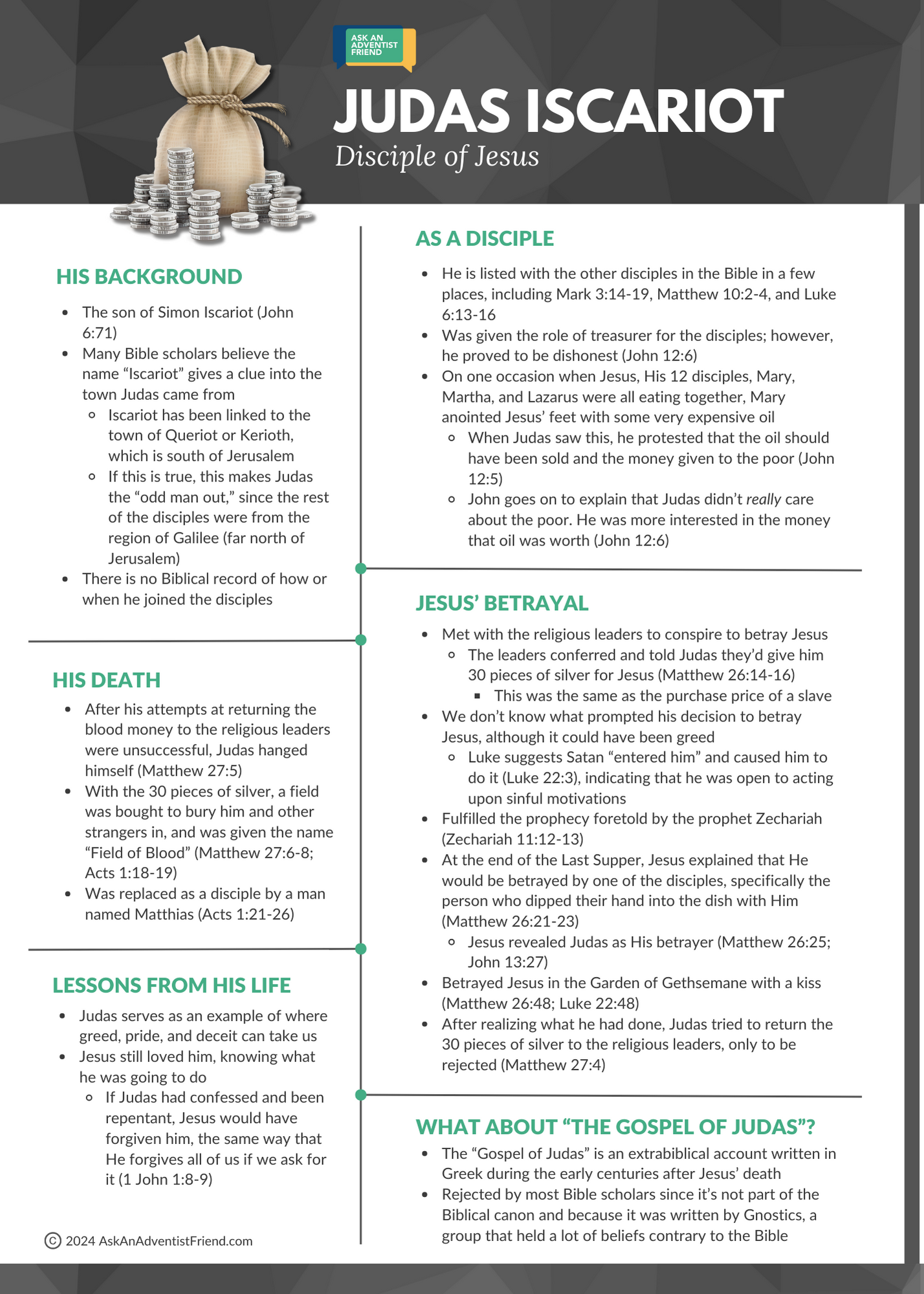Judas Iscariot, the Most Infamous Disciple of Jesus
The name Judas is one that many people throughout history, Christian and not, recognize for his act of betrayal.
He was the disciple who betrayed Jesus Christ to the authorities, which led to Him being crucified on the Cross.
While we don’t know a lot of personal details about this notorious man, the Bible offers clues into the mind and personality of Judas Iscariot. We’ll see what we can learn about:
- Judas’ background
- Judas as a disciple
- Jesus’ betrayal
- Judas’ death
- What Judas’ life means for us today
Let’s begin with some basics.
Judas’ background
Not much is known about Judas’ background except his name and his father’s name. He was the son of Simon Iscariot (John 6:71).
Bible scholars have used the name Iscariot to link to other potential backgrounds. For example, Iscariot could be a corrupted form of the Latin word sicarius, which means “murderer” or “assassin.”1 As his father bears the same family name, this would be coincidental but ironic, if the name was indeed a corruption.
Many Bible scholars also believe the name “Iscariot” gives a clue into the town Judas came from. Iscariot has been linked to the town of Queriot or Kerioth, which is south of Jerusalem.2 If Judas was indeed from this town, he was instantly the odd one out of the 12 disciples. The others were all from the region of Galilee, far north of Jerusalem.
We don’t know a lot of Judas’ background, and we don’t know how he joined the disciples. But we do know some of what happened during his time as a disciple, before he betrayed Jesus.
Judas as a disciple

Photo by Josh Appel on Unsplash
As a disciple, Judas received little attention in the Gospel accounts during Jesus’ ministry—the Bible doesn’t even say how he became a disciple. We can assume he accompanied Jesus and the other disciples as Jesus preached and healed among the Jews. He is listed a few places with the other disciples, including Mark 3:14-19, Matthew 10:2-4, and Luke 6:13-16.
But we do get a revealing glimpse of his character from a few key moments. The Gospel account of John especially reveals a few tell-tale incidents.
Judas was given the role of treasurer for the group. But John tells us that Judas wasn’t an honest treasurer:
“[Judas] was a thief, and had the money box; and he used to take what was put in it” (John 12:6, NKJV).
John includes this bit of information just after telling about another example describing Judas.
Not long before Jesus was betrayed and crucified, Jesus and the disciples visited their friends, Lazarus and Martha, in Bethany. Jesus had raised Lazarus from the dead earlier (John 11:43-44). When they were all eating together, Martha and Lazarus’ sister, Mary, anointed Jesus’ feet with some very expensive oil.
When Judas saw this, he exclaimed, “‘Why was this fragrant oil not sold for three hundred denarii and given to the poor?’” (John 12:5, NKJV).
John goes on to explain that Judas didn’t really care about the poor. He was more interested in the money that oil was worth.
“He didn’t say this because he cared about the poor but because he was a thief…” (John 12:6).
Right after this scene, the Gospel accounts of John, Matthew, and Mark all jump directly into the chain of events that would make Judas infamous forever.
Jesus’ betrayal

Photo by Stacey Franco on Unsplash
Judas’ betrayal of Jesus begins with Judas approaching the chief priests and scribes—the religious leaders.
What prompts him to do this, we don’t know for sure, but it could have been greed (he was a thief, after all), and Luke suggests Satan “entered him” and caused him to do it (Luke 22:3), indicating that he was open to acting upon sinful motivations.
Scholars debate over whether he literally became possessed by a demon, or if it is simply a way of saying he chose to follow these corrupt motivations, thus making him a tool of the devil.
Regardless, Judas went to the religious leaders and asked, “‘What are you willing to give me if I betray Him [Jesus] to you?’” (Matthew 26:14, NKJV).
The leaders conferred and told him they’d give him 30 pieces of silver for Jesus (Matthew 26:14). Which, by the way, was the value of a slave.3
Judas was satisfied.
This reflects the prophecy foretold by the prophet Zechariah (Zechariah 11:12-13). There’s more to it, though, so we’ll discuss it in depth in a bit.
Passover came, and Jesus and the disciples ate the Last Supper. Toward the end, Jesus explained that He would be betrayed by one of the disciples (Matthew 26:21).
The disciples were afraid and asked Jesus if they were the ones. Jesus responded that the person who dipped their hand into the dish with Him was the one who would betray Him (Matthew 26:23).
Then Judas said, “‘Rabbi, is it I?’” (Matthew 26:25, NKJV).
Jesus replied, “‘You have said it’” (Matthew 26:25, NKJV).
In John, Jesus gives a piece of dipped bread to Judas to reveal Jesus’ betrayer. We’re told that Satan entered Judas then, and Jesus said, “‘What you do, do quickly’” (John 13:27, NKJV). Judas immediately left the room.
Judas gathered the authorities and led them to where Jesus and the disciples were, now in the Garden of Gethsemane. Judas had told the authorities he would give the man they wanted a kiss of greeting (Matthew 26:48). So when he approached Jesus, he greeted Him and kissed Him.
Jesus, knowing what Judas would do, said to him, “‘Judas, are you betraying the Son of Man with a kiss?’” (Luke 22:48, NKJV).
The authorities seized Jesus and dragged Him away, beginning the events that would nail Jesus to a cross.
Judas’ death

Photo by Tamara Gore on Unsplash
Little did Judas know how soon he, too, would meet his end.
The Bible tells us that Judas was filled with remorse for his actions. When Jesus was turned over to Pontius Pilate—the Roman governor—for trial, Judas returned the 30 pieces of silver to the religious leaders, saying, “‘I have sinned by betraying innocent blood’” (Matthew 27:4, NKJV).
But the priests didn’t care and wouldn’t take the money back. “‘What is that to us?’” they retorted. “‘You see to it!’” (Matthew 27:4, NKJV).
Ellen White, a founder of the Seventh-day Adventist Church, offered these comments:
“As the trial drew to a close, Judas could endure the torture of his guilty conscience no longer. Suddenly a hoarse voice rang through the hall, sending a thrill of terror to all hearts: ‘He is innocent; spare Him, O Caiaphas! … Rushing to the throne of judgment, he threw down before the high priest the pieces of silver that had been the price of his Lord’s betrayal. … [Jesus] knew that Judas did not repent; his confession was forced from his guilty soul by an awful sense of condemnation.”4
After this, Judas hangs himself. Matthew writes, “Then [Judas] threw down the pieces of silver in the temple and departed, and went and hanged himself” (Matthew 27:5, NKJV).
Matthew goes on to record,
“But the chief priests took the silver pieces and said, ‘It is not lawful to put them into the treasury, because they are the price of blood.’ And they consulted together and bought with them the potter’s field, to bury strangers in. Therefore that field has been called the Field of Blood to this day” (Matthew 27:6-8, NKJV).
The book of Acts, however, seems to record a different death for Judas:
“Now this man [Judas] purchased a field with the wages of iniquity [the 30 pieces of silver]; and falling headlong, he burst open in the middle and all his entrails gushed out. And it became known to all those dwelling in Jerusalem; so that field is called in their own language, Akel Dama, that is, Field of Blood” (Acts 1:18-19, NKJV).
Although these two gruesome death accounts seem to contain different details, they are speaking of the same event. The differences between the accounts are rhetorical, meaning the authors used different ways to describe the same idea.5 After Judas hung himself, he was buried in the field that had been bought by the 30 pieces of silver.
His death and the buying of the potter’s field with 30 pieces of silver reflects the prophecy in Zechariah:
“Then I said to them, ‘If it is agreeable to you, give me my wages; and if not, refrain.’ So they weighed out for my wages thirty pieces of silver. And the Lord said to me, ‘Throw it to the potter’—that princely price they set on me. So I took the thirty pieces of silver and threw them into the house of the Lord for the potter” (Zechariah 11:12-13, NKJV).
All of these events had been predicted from centuries before. Whether or not Judas knew he was fulfilling them, we can’t know.
After Judas’ death and Jesus’ ascension back to heaven, the disciples appointed another to take Judas’ place.
Who replaced Judas as the twelfth disciple
Judas’ place in the 12 disciples was taken by a man called Matthias, who had followed Jesus from the beginning.
The disciples gathered, and Peter proposed,
“‘Therefore, of these men who have accompanied us all the time that the Lord Jesus went in and out among us, beginning from the baptism of John to that day when He was taken up from us, one of these must become a witness with us of His resurrection’” (Acts 1:21-22, NKJV).
Of these men, two were proposed: Joseph Justus (also called Barsabas), and Matthias.
They prayed over the decision and cast lots, and the lot fell to Matthias.
This is the only time Matthias is mentioned in the Bible, but we can assume he worked as fervently as the other disciples did during the first-century Christian church.
What Judas’ life means for us today

Photo by Nils Stahl on Unsplash
Judas may have lived a traitor’s life and was not truly repentant for his sins, but we can still take away a few important things from his life.
Judas is an example
Through Judas and his fate, we have a perfect example of where greed and pride and deceit can take us. John indicates that these qualities were present in Judas from the beginning, but he could’ve allowed Jesus to change his heart under His ministering and teaching.
Instead, he gave in to personal selfishness, leading him to betray the Savior of the world. He is the classic example of what not to do. His is a fate we can avoid if we listen to Jesus.
Jesus still loved him
Even as Jesus allowed Judas to be His disciple throughout His ministry, He knew someday this man would betray Him, condemning Him to a painful, agonizing death. Yet He still loved him, still gave him a chance, still sought to teach him how to behave.
Even when Jesus revealed Judas as the traitor, He spoke to the disciple with compassion and forgiveness in His voice. He simply told him to do what he was going to do quickly.
And had Judas confessed and been repentant, Jesus would have forgiven him, even as He forgives all of us if we ask for it (1 John 1:8-9).
Interestingly enough, there are some people that believe Judas always was in league with Jesus and never betrayed Him on his own greed and sinfulness. Here’s how.
The Gospel of Judas
The Gospel of Judas is an extrabiblical account written in the early centuries after Jesus’ death. Written in Greek, this text was discovered in Egypt in the 1970s and translated to English in the early 2000s.6
In this account, Judas is portrayed as a very close friend of Jesus. As such, he was the only person who really knew the true mission of Jesus, that He must die on the Cross for all humanity, instead of ascending a throne on earth and defeating the Romans.7
So, unlike the Bible’s account, which paints Judas as a cold-hearted betrayer, The Gospel of Judas describes him as the man Jesus instructed to betray Him, in order for God’s plan of salvation to work.8
However, most Bible scholars don’t accept this book as accurate for these reasons:
- It’s not part of the biblical canon. The early church leaders were very careful in selecting what should be included in the New Testament, choosing only what lined up accurately. If a book was left out, it likely had some theological or historical issues with it.9
- It was written by Gnostics. This group in the early centuries after Christ held a lot of beliefs that contradicted those of the Bible. Thus anything they wrote is subject to question by Christians.10
The Gospel of Judas might make an interesting read, but it’s not a source to trust for more insight into the character of Judas Iscariot.
The most infamous character
There are a large number of negatively-regarded people throughout the Bible. Undoubtedly, however, Judas Iscariot ranks among the worst. He was a thief and betrayer, which ultimately sent Jesus to His death.
While he is by no means a man we should desire to emulate, don’t forget that Jesus allowed him to be one of His disciples. He always forgave Judas for his actions, and would have forgiven him for betraying Him, had Judas sincerely asked.
Because that’s who Jesus is—a God of boundaryless, unwavering love. He doesn’t care what we did in the past or what we’re doing now. He still loves us so much that even if we never loved Him back, He would still have given up His life just for us. He will still forgive us now, if we sincerely ask for it.
What else did Jesus teach during His time on earth?
- “Judas Iscariot,” Britannica, October 17, 2023, https://www.britannica.com/biography/Judas-Iscariot. [↵]
- Pruitt, Sarah. “Why Jesus Was Betrayed By Judas Iscariot,” History.com, March 15, 2019, https://www.history.com/news/why-judas-betrayed-jesus. [↵]
- Denova, Rebecca. “Judas Iscariot,” World History Encyclopedia, https://www.worldhistory.org/Judas_Iscariot/. [↵]
- White, Ellen, Desire of Ages, pp.721-722. [↵]
- Seventh-day Adventist Bible Commentary, Acts 1:17. [↵]
- “Judas Iscariot,” Britannica. [↵]
- Ibid. [↵]
- Ibid. [↵]
- “‘Gospel of Judas’ is heresy and unreliable, Union experts say,” Union University, April 10, 2006, https://www.uu.edu/news/release.cfm?ID=1021. [↵]
- Ibid. [↵]
Questions about Adventists? Ask here!
Find answers to your questions about Seventh-day Adventists
More Answers
The Health Benefits of Fresh Air You Should Know About
The Health Benefits of Fresh Air You Should Know About“When you can’t breathe, nothing else matters,” the American Lung Association tells us. And while that’s true, the kind of air you’re breathing will determine the health benefits you experience. Breathing fresh...
What Do Seventh-day Adventists Choose to Eat?
What Do Seventh-day Adventists Choose to Eat?Food blogs overwhelm the internet; food fads are all the rage; and copycat and healthy versions of food are the subject of many a get-together. Eating—and eating the best way—is a big deal. And everybody has a different...
10 Incredible Ways Sunlight Can Improve Your Health
10 Incredible Ways Sunlight Can Improve Your HealthAre you concerned about sunlight’s negative effects? You might be the one who lathers on the sunscreen and covers up when you go outside. Or maybe you avoid being outside as much as possible. You might be surprised,...
Why Is Water So Important?
Why Is Water So Important?We all know that water is a substance we can’t live without. It quenches our thirst and keeps us hydrated on the inside. And it’s necessary for hygiene and cleansing on the outside too. But did you know that the cleansing properties of water...
Ellen White’s Writings and the Adventist Health Message
Seventh-day Adventists are known for their emphasis on healthy living. And Ellen G. White was a significant influence in the development of this priority and practice among Adventists.
Health Clinics
Ellen White and Adventist Healthcare—Ahead of Their Time Medical care in the mid-1800s was primitive, to say the least. Basic concepts we take for granted—such as proper handwashing or recognizing the dangers of bloodletting—were nonexistent. And doctors often had...
What Did Ellen White Teach about Vegetarianism?
What Did Ellen White Teach about Vegetarianism?One thing you might have heard about Seventh-day Adventists is their emphasis on a vegetarian lifestyle. If you’re wondering why that is, it goes back to our church’s humble beginnings: As Adventists studied the Bible,...
How Ellen White’s Teachings Can Improve Your Health
How Ellen White’s Teachings Can Improve Your Health Healthcare in the nineteenth century was said to leave “more disease than it took away” with its use of bloodletting and “medicines” like mercury and arsenic.1 As people questioned these methods, new approaches...
Change Your Perspective on Life with These 5 Mindsets
5 Biblical Mindsets to Change Your Life for the Better Sometimes, life is just plain hard. There’s no way around it. So would thinking about things differently really change anything? Our perspective on life, and everything it throws at us, affects more than we’re...
Bible Promises for When You’re Worried or Fearful
Bible Promises for When You’re Worried or Fearful The Bible is full of beautiful promises that can comfort us in a variety of situations. They can give us hope when we are hopeless, make us feel grateful for God’s love, and comfort us when we’re grieving or suffering....
12 Practical Ways to Overcome Worry
12 Practical Ways to Overcome Worry DISCLAIMER: This content is for informational purposes only. It does not constitute any professional medical advice and is not intended as a substitute for professional mental health therapy. It’s easy to get stuck in a cycle of...
How the Bible Talks About Worry, Fear, and Anxiety
How the Bible Talks About Worry, Fear, and Anxiety Worry and fear are the ingredients of anxiety. It’s easy to see how the world isn’t perfect—and the anticipation of a bad event or experience (that may or may not even happen) can end up draining the peace and...
How to Calm Anxious Thoughts, Using the Bible
How to Calm Anxious Thoughts, Using the Bible You were expecting a phone call from your daughter half an hour ago, and she still hasn’t called. She’s also not answering your calls. You feel your heart thumping as your thoughts race: What if she’s been in a car...
What You Should Know About the Adventist Health Studies
What You Should Know About the Adventist Health StudiesYou may have heard that Seventh-day Adventists care about health. But what you may not know is that Adventists have been the subjects of long-term research into lifestyle and health. Since 1958, researchers from...
Benefits of Sunlight
Yes, There Are Health Benefits of SunlightDespite the bad reputation it’s gotten, sunlight is generally associated with positivity, as shown by songs like “You Are My Sunshine,” or phrases that refer to delightful people as having a “sunny disposition.” There’s a...
Why Your Body Needs Rest for Optimal Health
Why Your Body Needs Rest for Optimal HealthStruggling to think straight? Wondering why you can’t remember that important tidbit you heard earlier today? Feeling like your emotions are about to explode? These are just some of the symptoms that can reveal your need for...
The Seventh-day Adventist Diet: One of Our Key Longevity Secrets
The Seventh-day Adventist Diet: One of Our Key Longevity SecretsOats, avocados, lentils, tofu—probably not what you first think of in a standard American diet. But if you show up at the home of an Adventist, chances are you may be served one of these staples. Out of a...
Why You Need Fresh Air
Why You Need Fresh Air“When you can’t breathe, nothing else matters,” the American Lung Association tells us. We couldn’t agree more! Breathing in clean air is an essential part of caring for our bodies, which God has given us. Together with other health principles,...
Sabbath Meal
Everything You Need to Know About Sabbath MealsFor Seventh-day Adventists, sharing a Sabbath meal with friends and family is one of the most special and memorable parts of the Sabbath. That’s why we want to share with you all about Sabbath meals and why they’re such a...
Adventists and Healthy Living
Adventists and Healthy LivingWhat’s the Adventist “Health Message” All About? One thing Seventh-day Adventists are known for is their emphasis on living healthy lives. Since our bodies are living temples of the Holy Spirit (1 Corinthians 6:19, 20), we strive to stay...
Water’s Importance—Physical Benefits and Spiritual Applications
Water’s Importance—Physical Benefits and Spiritual Applications We all know that water is a substance we can’t live without. Not only does it quench our thirst and keep us hydrated from the inside, but it’s necessary for hygiene and cleansing on the outside as well....
How Important is a “Day of Rest?”
How Important is a “Day of Rest?” Why God Created a Day for Downtime by Martin Casper Do you ever experience the feeling of complete overload? Do you feel like the only way you can get ahead is by slamming it 24/7? I hear these types of comments more and more...
7 Reasons Why a Day of Rest is Important
7 Reasons Why a Day of Rest is ImportantWe live in a fast-paced world. It seems as if success is measured in how much you can do in a short amount of time. (Extra points for the service or product that is available 24/7). The idea that we will be more successful if we...
How do Adventists choose what to eat?
How do Adventists choose what to eat?Every day, parents go through the ritual of getting their kids to eat what is healthy and good while trying to steer them away from what can hinder the growth of their developing bodies. Nutritionists work with their clients to...
How Can I Have a Better Marriage?
Is it possible to have a happy marriage?
How do Adventists make movie and music choices?
How do Adventists make movie and music choices?Cinema has come a long way since the first clips of motion pictures came to light in 1878. As the decades rolled on, film and music producers have created rivers of movies and albums for the masses. Today, watching movies...
Why are many Adventists Vegetarian?
Why are many Adventists Vegetarian?The diet intended for man is outlined in Genesis 1:29, “And God said, ‘See, I have given you every herb that yields seed which is on the face of all the earth, and every tree whose fruit yields seed; to you it shall be for food.’”...
Didn’t find your answer? Ask us!
We understand your concern of having questions but not knowing who to ask—we’ve felt it ourselves. When you’re ready to learn more about Adventists, send us a question! We know a thing or two about Adventists.





















